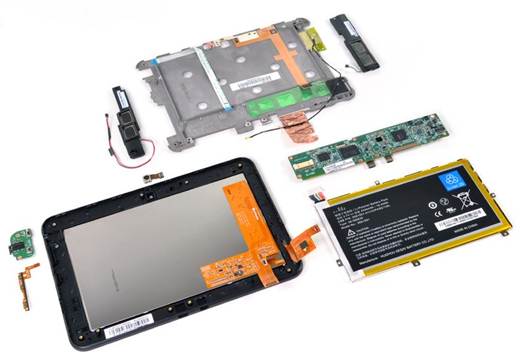Amazon carved out its very own niche in the
tablet market when it released the first Kindle Fire. A year on and Amazon has
built on the success of the original, by incorporating a mix of tried and
tested features with added twists to create the fantastic Kindle Fire HD 7.
From the outside, the Fire HD looks like
any regular seven-inch tablet, sporting a black rectangular shape and curved
edges. When you dig a little deeper, however, the Fire HD has a lot to shout
about. The seven-inch IPS LCD display has a 1,280x800 resolution, and
incorporates anti-glare technology to make viewing angles a lot clearer, and
using the tablet in direct sunlight a whole lot easier. The tablet weighs in at
395 grams, and is only 10.3mm thick, meaning it’s one of the lightest tablets
on the market today. It benefits from a wide range of ports; including a 3.5mm
jack, micro USB and micro HDMI video output for connecting to a TV.

Inside
the Kindle Fire HD
Powering the tablet is a 1.2GHz dual-core
processor, which should have enough power to cater for some multitasking and
high-end gaming.
Alongside the processor is a Imagination
PowerVR graphics core for boosted performance while gaming and streaming media.
As is common practice with most new Android tablets, the Fire HD is able to
play high definition video at 720p, which you’ll be able to put to great use
with the one month of LOVEFiLM subscription that’s also bundled free with the
tablet.
Amazon has used Android 4.0 for the
operating system, but all traces of the Ice Cream Sandwich user interface have
been removed, replaced with a wholly new design that is very heavily focused on
the Amazon storefront, with links to movies, books and magazines all listed on
the home screen. For all that downloading you’ll want to do, you’ll take full
advantage of the dual-antenna built into Amazon’s tablet. The Fire HD is the
first tablet to use this technology, and Amazon claims it will result in
improved Wi-Fi connections, and markedly faster download speeds.
There are versions of the Fire with storage
ranging from 8GB in the revamped version of the original model up to 32GB.
Further expansion is available from Amazon’s cloud storage software, which is a
great way of storing any movies you’ve downloaded on to your device. The Amazon
ecosystem is fantastic, and through the tablet you’ll have access to over a
million books, 150 magazines and 60,000 apps through the Amazon Appstore.
The Fire HD also includes Whispersync - an
eye-catching feature that lets you sync all your downloads across multiple
devices.
Ultimately, with so much emphasis placed on
selling Amazon’s content, the real test of the device will be how well it
functions as a day-to-day tablet. For consuming movies, books and magazines it
may well be unrivalled, but will it be able to match the Nexus for its
all-round capabilities?
Spec wars: Kindle vs Nexus 7
Struggling to decide which tablet
should earn your hard-earned cash? Here’s a quick overview of their key
features...

Ecosystem
·
Kindle Fire: You’ll find over a million books at your
disposal, thanks to the Amazon storefront. The Amazon App store currently holds
only 60,000 apps however, considerably less than the Play store.
·
Nexus 7: There aren’t as many books or movies on the
Play store, but with over 400,000 apps at your fingertips, you won’t have any
trouble finding new content to spruce up your device.
Winner: Nexus 7
Storage
·
Kindle Fire: There are two variants of the Fire HD,
with storage starting at 16GB and going up to 32GB. For extra storage, users
can use Amazon Cloud, which also supports the Cloud Player music service.
·
Nexus 7: Google’s tablet Is available in 8GB and 16GB
variants. Users are also given 5GB of storage to use with Google Drive’s cloud
service without needing to pay for more.
Winner: Kindle Fire
Build
·
Kindle Fire: The IPS LCD screen has been bumped up to
1,280x800 from the original Fire, and Includes new technology to help lower
glare and Improve viewing angles.
·
Nexus 7: The Nexus 7 includes a 1,280x800 IPS LCD
screen, but lacks the micro HDMI port for sharing content to TVs that gives the
Kindle Fire HDthe edge.
Winner: Kindle Fire
Processor
·
Kindle Fire: The 1.2GHz dual-core processor found in the
Fire HD is certainly a step up from the original. Multitasking won’t be a
problem for this powerful processor.
·
Nexus 7: The quad-core Tegra 3 processor blows away the
competition. Multitasking is a breeze, and you’ll have no problem playing the
most graphically capable games. Stunning performance.
Winner: Nexus 7
Price
·
Kindle Fire: Both variants of the Kindle Fire HD come
in at under the $320 mark. The 16GB version retails for $254.4 and the 32GB
version retails for a cool $318.4.
·
Nexus 7: Similarly to the Fire HD, both variants of the
tablet come in at under the $320 mark. The storage on offer is half at the
equivalent prices, but it’s still a great value tablet.
Our verdict
It’s a tight contest between two very
similar devices with key differences.
The Kindle Fire may win out for media
content, but the Nexus 7 looks likely to win out in the role of tablet
all-rounder, thanks to its greater app store and more powerful specs.